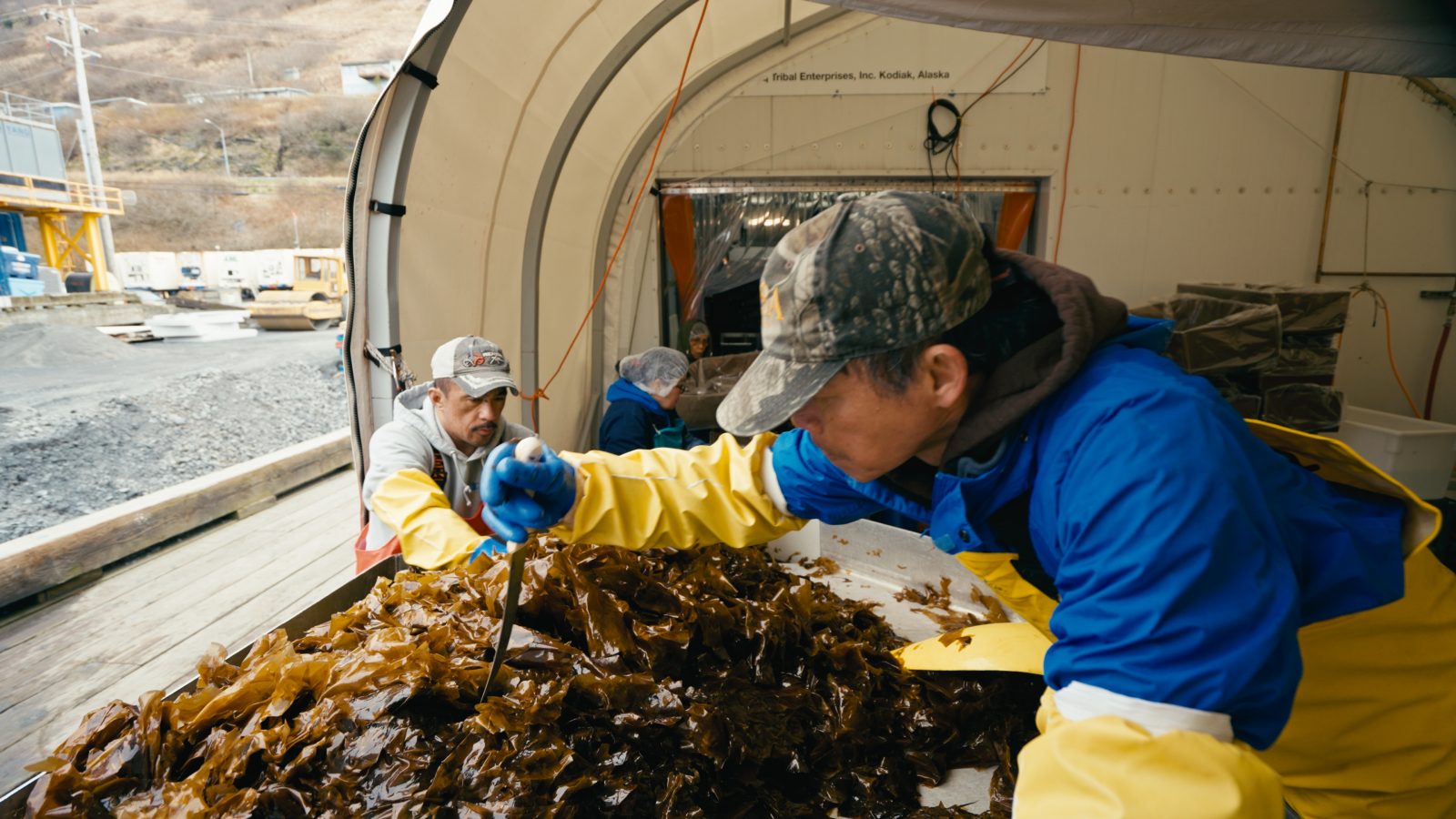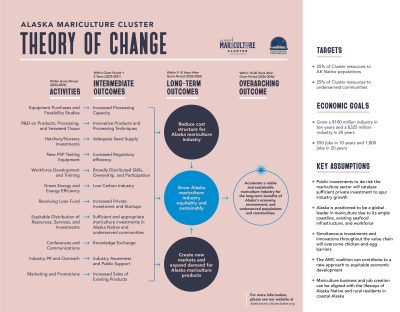Search AMC News
AMC Theory of Change & Evaluation Survey
February 4, 2025
Lead Entities: Ecotrust, Southeast Conference
Grant Component: Grant Administration

The Alaska Mariculture Cluster (AMC) is a four-year grant-funded project aiming to stimulate Alaska’s mariculture industry through strategic investments that de-risk the sector and drive private investment. AMC began issuing funds in early 2023 to a suite of subawardees and contractors, including economic development districts, seafood industry associations, universities, Alaska Native organizations, state agencies, and nonprofits. Each of these entities is working to advance one or more grant component projects throughout Alaska’s coastal regions.
Together, the AMC coalition aims to create a $100 mariculture industry in ten years and $325 million industry in 20 years while also targeting 25% of project services reach underserved communities and 25% to support Alaska Natives. In April 2024, Southeast Conference, the AMC’s lead entity, began working in partnership with the nonprofit Ecotrust to develop metrics and evaluate the AMC grant program on an ongoing basis. This involves measuring shifts in industry growth, private investment, tracking project success, and engaging with members of the mariculture industry, Tribal leaders, rural communities, and others via 1-on-1 interviews, focus groups, and surveys.
Through initial engagement efforts and building on AMC grant’s Overarching Narrative, Ecotrust and Southeast Conference collaborated to produce the AMC’s theory of change, which illustrates the coalition’s vision for accelerating a viable and sustainable mariculture industry for the long-term benefits of Alaska’s economy, environment, and communities.
What is a Theory of Change?
Theory of change is a framework that helps organizations understand how a given intervention, or set of interventions, leads to the desired change. A theory of change also helps to identify the underlying assumptions and risks that will be vital to understand and revisit throughout the process to ensure the approach will contribute to the desired change.

Click image to enlarge / Click here for PDF
Key assumptions in the AMC’s theory of change include the belief that strategic investment in infrastructure, workforce development, and market access will significantly lower barriers to entry in mariculture. Additionally, fostering collaboration among industry members, Tribal entities, and agencies is expected to create a more resilient and inclusive industry.
“At Ecotrust we’re committed to equitable evaluation that, among other principles, prioritize cultural responsiveness, collaboration, and the needs of our community partners,” says Noah Enelow, Ph.D, Director of 3E Research and Evaluation. “This evaluation is an opportunity for us to put our equity-centered evaluation principles to action and use all our evaluation tools in the service of a fascinating and complex project.”
Questions about the evaluation process can be directed to Noah Enelow, Ecotrust’s Director of 3E Research and Evaluation. Individuals who are interested in participating in the evaluation process can indicate their interest through this online survey.
Background
Southeast Conference (SEC) is the federally designated Economic Development District (EDD) for Southeast Alaska, as well as the state designated Alaska Regional Development Organization. SEC’s mission is to undertake and support activities that promote strong economies, sustainable communities, and a healthy environment in Southeast Alaska.
In September 2022, Southeast Conference was awarded a $49 million U.S. Economic Development Administration (EDA) Build Back Better Regional Challenge (BBBRC) grant to catalyze a viable and sustainable mariculture industry in Alaska, supporting the production of shellfish and seaweed, for the long-term benefit of the state’s economy, environment, and communities.
SEC leads the Alaska Mariculture Cluster (AMC) grant coalition, which includes members of Alaska’s mariculture industry, tribal organizations, regulatory agencies, university system, regional EDDs, trade organizations, and others. A Governance Body, composed of AMC coalition leaders and Tribal executives from each of the project regions, guides the grant’s work and equity metrics.
The AMC has complementary grant components designed to break down barriers and develop Alaska’s mariculture industry. The Overarching Narrative explains how the grant components work together to grow the industry in an equitable and responsible manner. The full project period for the AMC BBBRC project is October 1, 2022 to September 30th, 2026.

